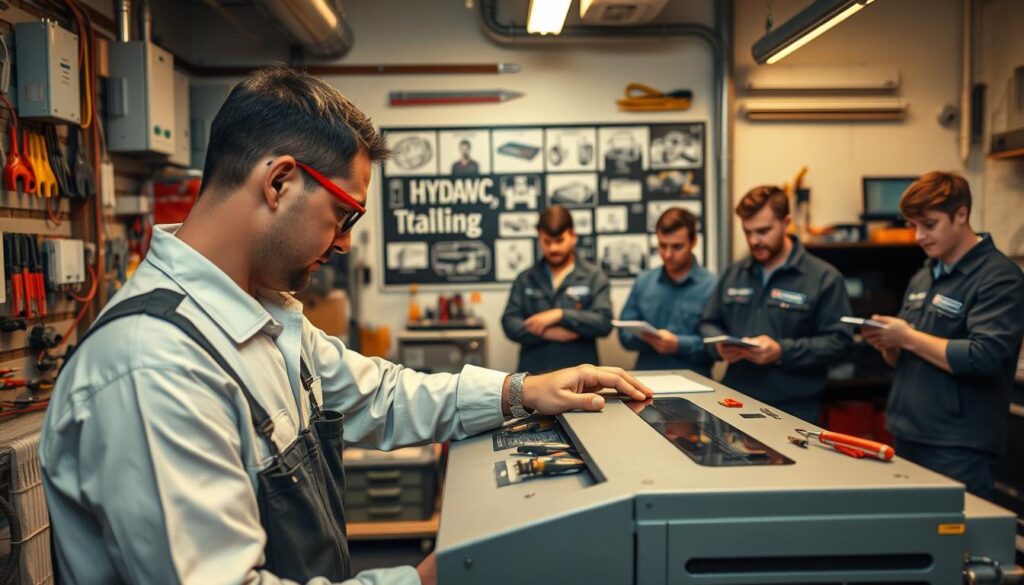Affiliate Disclosure
HVAC Guide Guys is a participant in the Amazon Services LLC Associates Program, an affiliate advertising program designed to provide a means for sites to earn advertising fees by advertising and linking to Amazon.
How Hard Is It to Be a HVAC Technician? Are you thinking about becoming an HVAC technician? It’s a stable and rewarding career. But what does it really mean to work in this field?

HVAC technicians are key to keeping our spaces comfortable. With over 650,000 in the field, it’s a growing industry. It’s perfect for those who love technical work and solving problems.
To understand the HVAC technician job, we need to look at its challenges and benefits. They install complex systems and fix tricky electrical issues. This job requires technical know-how, physical strength, and a commitment to learning.
Key Takeaways
- HVAC technicians enjoy a stable career with strong job growth
- Technical skills and physical fitness are essential for success
- Entry-level opportunities exist with minimal educational investment
- Potential to earn competitive salaries starting around $49,500 per year
- Continuous learning is key in this changing field
Table of Contents
Understanding the HVAC Technician Role
Being an HVAC technician means more than just fixing heating and cooling systems. You’ll handle a variety of technical tasks and solve problems in different places.
HVAC experts keep indoor spaces comfy and safe for homes, offices, and factories. They work in many settings, needing to be flexible and skilled.
Core Responsibilities and Daily Tasks
Your day could include:
- Installing new heating and cooling systems
- Doing routine checks and maintenance
- Finding and fixing system problems
- Repairing electrical and mechanical parts
- Testing how well systems work
Work Environment and Physical Demands
HVAC techs face tough conditions that test their strength and focus. You might:
- Work in small, cramped spaces
- Deal with heavy tools
- Climb ladders and go on rooftops
- Face extreme temperatures
Types of HVAC Systems and Equipment
| System Type | Primary Application | Complexity Level |
|---|---|---|
| Residential Split Systems | Single-family homes | Low |
| Commercial Rooftop Units | Office buildings | Medium |
| Industrial HVAC | Manufacturing facilities | High |
| Geothermal Systems | Energy-efficient buildings | Advanced |
“Success in HVAC is about understanding complex systems and solving real-world challenges.” – HVAC Industry Expert
Your job needs you to keep learning, be technically good, and love keeping places comfortable.
Explore Our HVAC Shop
Looking for top-rated HVAC tools, parts, and accessories? Visit our shop and find the perfect solution for your needs.
Visit the ShopEducational Requirements for HVAC Technicians
Starting a career as an HVAC technician requires understanding the basics. You need a high school diploma or its equivalent. This is the first step towards learning about heating, ventilation, and air conditioning systems.
To become an HVAC technician, you must complete specialized training. This training is designed to teach you practical skills and technical knowledge. You can choose from different types of programs:
- Certificate programs (6-12 months)
- Associate degree programs (2 years)
- Vocational school training
- Community college courses
The HVAC certification process is key for your career growth. Most programs mix classroom learning with hands-on training. This prepares you for the challenges you’ll face in the field.
| Program Type | Duration | Credits | Cost Range |
|---|---|---|---|
| Certificate Program | 9-10 months | 30 credits | $1,200 – $5,000 |
| Associate Degree | 2 years | 60 credits | $5,000 – $15,000 |
“Invest in your education to build a solid foundation for a successful HVAC career.” – Industry Expert
Getting certifications like EPA Section 608 and NATE Core is important. They show you know how to work with refrigerants and have basic HVAC skills.
Apprenticeships offer more learning, lasting 2-5 years. They provide on-the-job training and help you get the experience employers want.
How Hard Is It to Be a HVAC Technician
Becoming an HVAC technician is not easy. It requires physical strength and technical skills. Knowing what this job entails helps you decide if it’s right for you.
Physical Challenges and Demands
HVAC technicians face tough physical demands. They work in environments that test their strength and endurance. Some common challenges include:
- Lifting heavy equipment weighing up to 50-100 pounds
- Working in tight spaces like attics and crawl spaces
- Standing for extended periods during installations
- Climbing ladders and navigating rooftops
Technical Knowledge Requirements
Being a HVAC technician is technically complex. You need to understand electrical, mechanical, and computer systems. To succeed, you must have:
- Strong mathematical skills
- Understanding of electrical circuits
- Computer diagnostic capabilities
- Advanced troubleshooting techniques
Problem-Solving Aspects
HVAC technicians must solve complex problems fast. Critical thinking is key. They deal with issues like:
- Intricate system malfunctions
- Refrigerant leaks
- Electrical component failures
- Efficiency optimization challenges
“Success in HVAC isn’t just about technical skills, but adaptability and quick thinking.” – HVAC Industry Expert
Explore Our HVAC Shop
Looking for top-rated HVAC tools, parts, and accessories? Visit our shop and find the perfect solution for your needs.
Visit the ShopEssential Skills and Qualifications

To be a top HVAC technician, you need both technical skills and people skills. You must be good at solving problems and working with customers. These skills are key to doing well in this job.
“Success in HVAC is not just about technical knowledge, but about solving problems and connecting with customers.” – HVAC Industry Expert
Being great at HVAC isn’t just about knowing how things work. You also need to be good at personal skills. This mix of technical and personal abilities is what makes a technician stand out.
- Technical Skills
- Electrical system understanding
- Mechanical troubleshooting
- Refrigeration system knowledge
- Blueprint reading
- Soft Skills
- Customer service
- Time management
- Communication
- Problem-solving
Getting your HVAC certification is a big step. It helps you learn these important skills. Employers want technicians who can fix complex problems and also treat customers well.
| Skill Category | Key Competencies | Importance Rating |
|---|---|---|
| Technical Proficiency | System diagnostics, repair techniques | 90% |
| Physical Capabilities | Strength, stamina, mobility | 85% |
| Communication | Client interaction, clear explanations | 80% |
Continuous learning is key in the HVAC world. New technologies and methods come out all the time. Technicians must keep up with these changes to do their job well.
HVAC Training and Certification Process
Starting your HVAC training and certification journey can be tough but rewarding. It’s a path filled with important steps to get you ready for a career in HVAC. This field is always changing, and you’ll need to keep up.
Required Certifications
To be a pro HVAC technician, you must meet certain training needs. The certification process includes:
- Finishing a formal HVAC training program
- Gaining practical work experience
- Passing certification exams recognized by the industry
EPA Licensing Requirements
The U.S. Environmental Protection Agency (EPA) requires a special certification for HVAC techs. This EPA Section 608 Certification exam is key to your hvac certification.
“Proper certification is not just a requirement, it’s your gateway to a professional HVAC career.”
Continuing Education
Keeping up with hvac continuing education is vital in this fast-changing field. Technicians must keep learning to stay ahead.
| Education Type | Duration | Cost Range |
|---|---|---|
| Certificate Program | 6-12 months | $500 – $2,000 |
| Associate Degree | 2 years | $5,000 – $30,000 |
| Apprenticeship | 3-5 years | Paid training |
There are many ways to keep learning:
- Professional workshops
- Online training courses
- Industry conferences
- Technical seminars
Investing in your professional growth keeps you ahead in HVAC tech and the job market.
Explore Our HVAC Shop
Looking for top-rated HVAC tools, parts, and accessories? Visit our shop and find the perfect solution for your needs.
Visit the ShopCareer Path and Advancement Opportunities

Your HVAC career offers exciting growth and development chances. As an HVAC technician, you can take many paths to move up. The industry has many options for those who want to grow their skills and knowledge.
Starting jobs often include being an HVAC apprentice or maintenance technician. As you get more experience, your salary can go up a lot. Here’s a look at how your career can progress:
- Entry-Level (0-2 years): Starting at about $22.47 per hour
- Mid-Level (3-6 years): More responsibility and skill growth
- Senior-Level (7+ years): Advanced technical roles with better pay
There are many ways to advance in the HVAC field, including:
- Project Management
- System Design
- Energy Management
- Sales Engineering
- Technical Training
“The HVAC field offers remarkable flexibility for professionals willing to continuously learn and adapt.” – Industry Expert
With a 5% job growth expected from 2021 to 2031, your HVAC career looks bright. Many technicians start their own HVAC businesses after 10+ years of experience.
Keep learning and getting more certifications to boost your career and salary. The more specialized skills you have, the more valuable you’ll be in this changing industry.
HVAC Industry Job Outlook and Growth
The HVAC industry is booming, with great opportunities for new technicians. The U.S. Bureau of Labor Statistics has exciting news for those interested in this field.
Employment Statistics
In 2022, the U.S. had 415,800 HVAC technician jobs. There were 37,700 new job openings expected each year until 2032. This means a 6% growth rate, showing a strong need for skilled workers.
Geographic Opportunities
Some states have even better chances for HVAC careers:
- Texas: 21% projected growth
- New York: 20% projected growth
- California: 14% projected growth
Salary Expectations
Your salary in HVAC can change based on your experience and area of focus. In May 2022, HVAC technicians made a median of $51,390. Salaries can range from $36,170 to $82,630.
| Industry Sector | Median Annual Wage |
|---|---|
| Wholesale Trade | $57,760 |
| Educational Services | $54,950 |
| Plumbing & HVAC Contractors | $49,630 |
“The HVAC industry offers stable career growth with diverse opportunities across multiple sectors.” – Industry Expert
As we focus more on energy efficiency, HVAC techs are in high demand. The U.S. Department of Energy notes a rise in energy-efficient tech. This suggests HVAC jobs will be secure for a long time.
Tools and Technology in HVAC
Being an HVAC technician means knowing the right tools and technology. Your skills will show how well you use the equipment needed for heating, cooling, and ventilation systems.
Important tools for HVAC pros include:
- Digital multimeters for electrical checks
- Refrigerant manifold gauges
- Pipe cutters and benders
- Thermal imaging cameras
- Leak detection tools
Today, HVAC training focuses on using new tech. You’ll learn about smart thermostats, building automation systems, and IoT devices. Keeping up with these changes is key to success.
“Technology is changing faster than ever in the HVAC world. Continuous learning is not just an option—it’s a necessity.” – HVAC Industry Expert
Digital tools are changing how we diagnose problems. Wireless sensors and mobile diagnostic apps help technicians work faster and more accurately.
Buying the right tools is a smart move for your career. Starting out, you might spend $200 to $500 on basic tools. This can really boost your skills.
Explore Our HVAC Shop
Looking for top-rated HVAC tools, parts, and accessories? Visit our shop and find the perfect solution for your needs.
Visit the ShopSafety Considerations and Workplace Hazards
Working in HVAC comes with many risks. Your safety is key in tough HVAC jobs that need hard work and skill.
HVAC training teaches you to handle risks well. You must always follow safety rules to keep yourself and others safe.
Common Safety Protocols
HVAC workers must follow strict safety rules. These rules help avoid accidents. Some important ones are:
- Maintaining three-point contact when using ladders
- Securing pressurized gas cylinders properly
- Following electrical safety procedures
- Implementing proper chemical handling techniques
Personal Protective Equipment
Wearing the right gear is vital in HVAC. You should use:
| PPE Item | Purpose |
|---|---|
| Steel-toed work boots | Foot protection |
| Safety goggles | Eye protection |
| Respirators | Respiratory hazard prevention |
| Thick work gloves | Hand protection |
Emergency Procedures
Knowing how to act in emergencies is key. Fast action can save lives. There are many risks at work:
According to the U.S. Bureau of Labor Statistics, 7,900 workplace illnesses and injuries were reported in the HVAC industry in 2020.
Always put safety first. Stay alert to dangers and keep learning about HVAC safety.
Specializations Within HVAC
The HVAC industry has many career paths for those who want to specialize. By focusing on certain areas, your career can grow a lot. This field is always changing, making it exciting to explore different paths.
There are many specializations that can boost your skills and pay. Here are some examples:
- Residential HVAC Specialist: Focus on home heating and cooling systems
- Commercial Refrigeration Expert: Work with complex cooling systems in businesses
- Solar Panel Installation Technician: Integrate renewable energy solutions
- Building Automation Systems Technician: Manage smart building technologies
- Energy Auditor: Evaluate energy efficiency in buildings
Getting more education is key to mastering these specializations. Many technicians get extra certifications. This helps them become experts in areas like industrial HVAC or geothermal heating.
“Specialization transforms a good technician into an exceptional professional.” – HVAC Industry Expert
Each specialization needs its own set of skills and knowledge. For example, refrigeration technicians must know about refrigerant rules. Solar installation specialists need to know about photovoltaic systems.
Choosing and growing in these specializations can make your career better. It can open up more job opportunities and make you more valuable in the market.
Conclusion
Exploring the HVAC technician career shows it’s exciting and full of chances. The HVAC field is growing fast, with jobs expected to rise by 15 percent by 2026. States like California, Texas, and Florida have over 20,000 HVAC jobs waiting.
Understanding the HVAC career means seeing its mix of challenges and rewards. The average salary of $47,380 is a good start for your career. Training takes six to 24 months, making it a quick way to a stable job.
Being an HVAC technician is more than a job. It’s key to keeping places comfortable and efficient. You’ll have a steady job with chances to specialize in different areas. The field is growing thanks to new buildings and green rules.
Success in HVAC needs hard work, technical skills, and a flexible mind. The career offers growth, good pay, and the joy of solving tough problems. It’s a great choice for those eager to grow professionally.
